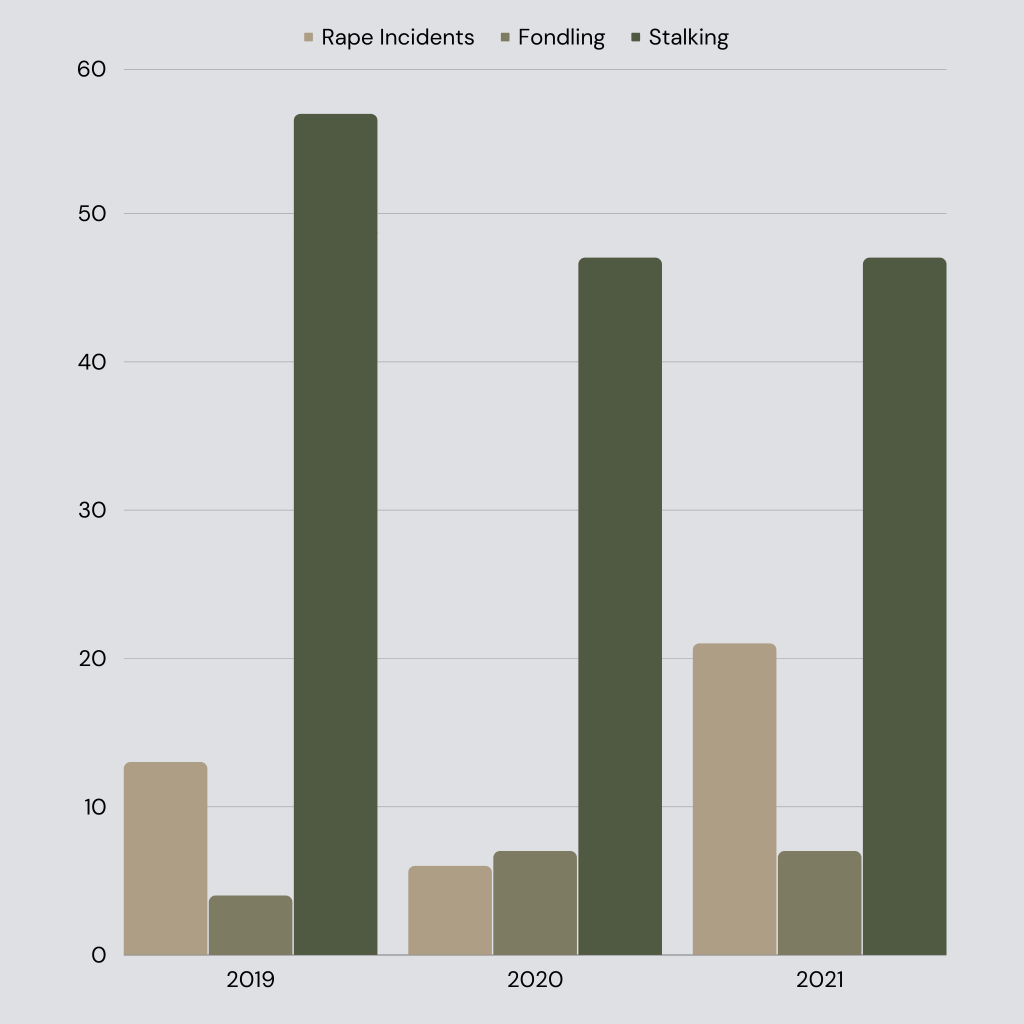Binghamton University’s 2022 Security and Fire Report reflects a wave of crime statistics that have shifted these past few years, including stalking and rape.
The 2022 report covers reported crime incidents on and adjacent to campus in 2019, 2020 — the year BU was largely under remote learning — and 2021. In 2019, 13 rape incidents were reported, while six were reported in 2020 and 21 in 2021 — which is BU’s highest reported number of rape incidents since before 2014, according to pressconnects. Reported incidents of dating violence have declined since 2019, with 19 incidents reported in 2019, 12 in 2020 and 14 in 2021. Reported incidents of stalking have also declined since 2019.
The Annual Security and Fire Report, filed yearly by the University’s Clery Act Coordinator and included in the Student Handbook, is a collection of campus reports investigating crime and fire safety procedures. The report is required by the Jeanne Clery Disclosure of Campus Security Policy and Campus Crime Statistics Act of 1990, more commonly referred to as the Clery Act.
According to Andrew Baker, BU’s senior compliance officer and Title IX coordinator, it is likely the number of reported incidents is less than the amount that actually occurs. Baker said the University provides annual training to its staff in an effort to encourage victims to report these kinds of incidents.
“Historically, victims underreport what has happened to them,” Baker wrote in an email. “The University has worked to eliminate barriers to reporting and train students and staff to respond in a manner that supports victims. These efforts include annual training for all Residential Life staff and the establishment of the [Violence, Abuse and Rape Crisis Center] in Old Johnson Hall, among other ongoing educational and training efforts.”
In regard to stalking incidents, the 2022 Security and Fire Report recorded 57 incidents in 2019, 47 in 2020 and 47 again in 2021.
Halle Nelson, the communications specialist for the National Sexual Violence Resource Center (NSVRC), a national resource that educates about sexual violence and advocates for victims of sexual assault, said there is a correlation between stalking and sexual misconduct.
“As far as stalking goes, there definitely has been overlap between it and sexual violence,” Nelson wrote in an email. “Sexual violence is most often perpetrated by someone the victim knows, and stalking is often committed by a current or former intimate partner.”
The NSVRC website directs anyone in need of immediate service to contact the Rape, Abuse and Incest National Network (RAINN), a national hotline for sexual assault victims which can be reached 24/7 at their online chat service or at 1-800-656-4673 for direction to a local rape crisis center.
Jacey Ruisi, a sophomore double-majoring in English and psychology, said she believes the statistics are likely a result of victims feeling hesitant to seek help or file a report. Ruisi further stressed the importance of mental health support for victims.
“I am not surprised by these stats, and I feel like most people probably don’t even report,” Ruisi said. “I think that if stats are higher one year, it doesn’t necessarily mean there were more incidents, it just means there were more victims who spoke up. I think that we just need to emphasize mental health support more, and when that happens stats may just go up again anyway because people will be educated more on boundaries, so people will be even more validated in speaking up.”
Gianna Barbero, a freshman majoring in biomedical engineering, said she was surprised by the increasing rape statistics and believes a yearly rape prevention course should be implemented to encourage discussion of incidents.
“I am surprised by the change from 2020 to 2021, and I think there needs to be a more open atmosphere to talk about [rape],” Barbero said. “As a freshman, it was mandatory to take a rape prevention [course]. I think everyone should take that every year. There needs to be a better atmosphere for people to feel comfortable talking about it and reporting it. I’m not entirely sure if anything could make [the statistics] decrease.”
In the event of an emergency, the University encourages students to contact University Police at 911. To report an incident to the Title IX office, students can contact Baker at 607-777-2486 or file an anonymous report through the Title IX website.



